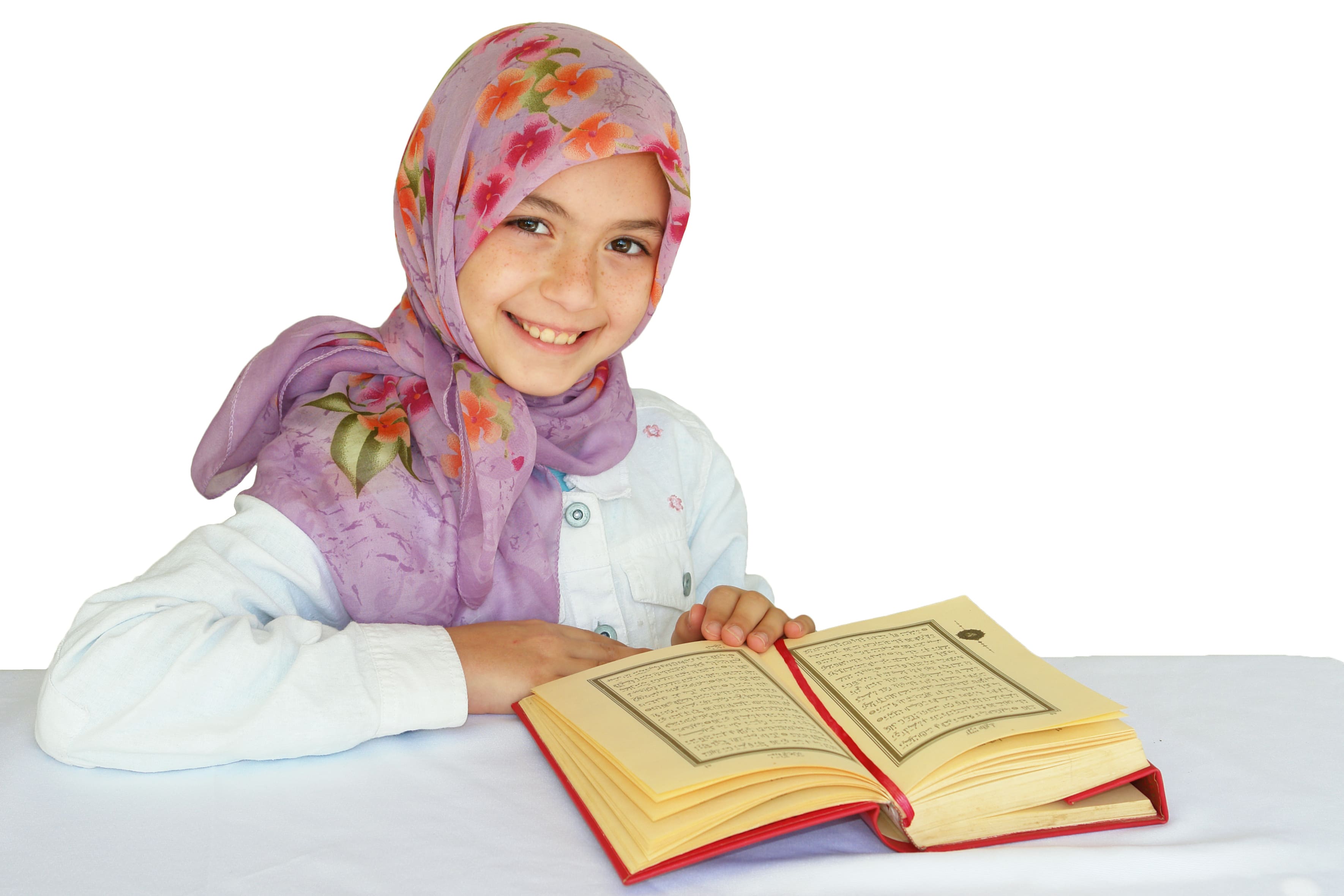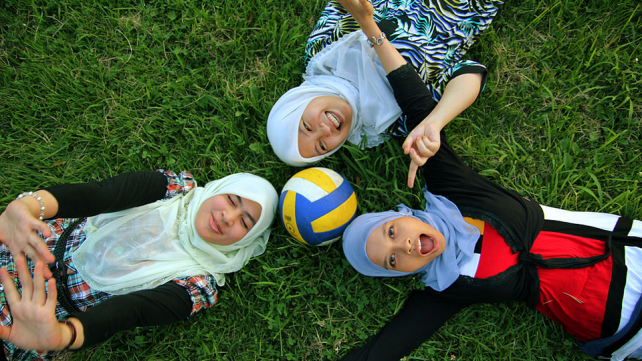

Children's Rights in Islam From Middle Childhood to Adolescence
A significant part of children's rights in Islam address the needs and demands of children during their years of adolescence.
Instruction for Middle Childhood (8 to 14 years old)
Middle childhood is the most decisive period of life, considering children's rights in Islam. It is a time when children develop fundamental skills for building healthy social relationships and learn roles that will make them ready to be confronted with adolescence and adulthood.
According to Islam, in this period a child should first be given necessary religious education so that he/she may not be misinformed and misled by anyone in belief or action.
In this stage, children should start to learn writing and reading. Also, moral characteristics and attributes should be institutionalized in their mind, and their acts step by step.
Imam Baqir (AS) has asserted: “When the child completes seven years, he should be asked to wash his face and hands, and then told to pray. This will continue till he reaches the age of 9 years, when he should be taught proper Wudu (Ablution), and should be guided by parents if he is not careful and proper Salat (prayer) - and he should be reminded if he is not regular” [1].

It is worth mentioning that puberty in most girls will begin at around 8-14 years. If a girl has reached puberty in this period, she must do all acts of worship that an adult is required to do. Parents should have particular attention to the girls in this age. So she must fast in Ramadan, and she must also cover her head when she prays and thus must be in full Islamic prayer clothing.
Prophet Muhammad (PBUH&HP) emphasized the teachings of two things to male children, as a part of children's rights in Islam. He said: “It is the right of the male child on his father to teach him the Book of God (Holy Quran), riding, and swimming.”[2]. It is also narrated that the prophet believed the duty of a father to be teaching his son to write [3].
The character of children is supple; they may easily be bent in any direction. If they are not given proper moral and religious education at this stage, changes of manner and thought would be difficult.
Children's Rights in Islam During Adolescence (after 14 years old)
This period is between childhood and adult age. After the age of 14, the human mind becomes stronger and new horizons are opened in front of one’s eyes. Therefore, puberty, marriage, domestic life and its complex problems come to the fore.
Nowadays, the young adults soon realize that he needs to look after himself in future; he knows that with every day passing, he becomes closer to the responsibilities and accountability of a family.
It is the right of adolescent to be involved in every decision making in family and parents should consider their opinions. As Prophet Muhammad (PBUH&HP) mentioned the child is the master for seven years and a slave for seven years and a vizier for seven years [4].
One of the children's rights in Islam that parents should observe is to be provided with marriage when they are old enough, without delaying it. Indeed, the Holy Quran and the Prophet (PBUH&HP) advise that young people be married when they are old enough [5].

The prophet (PBUH&HP) said: “Among the rights of the child over the parents are three: To give him a good name, to teach him to write and to help him marry when he comes of pubescence [6].
The aim of Islam regarding family can only be accomplished with the help of a good marriage. Accordingly, marriage is an important part, and significant matter of domestic discipline and children should be educated by parents in this matter.
Parents are responsible for providing the requirements of marriage. Actually, ideal primary education should be given to children by their parents and their duties are fulfilled by providing them with a job and helping them to marry.
References:
- Ibn-e Fazl-e Tabarsi, Makarim Al Akhlaq, p. 115.
- Muhammad ibn Ya‘qūb al-Kulaynī, Furū al-Kāfī, vol 6, p. 187.
- Abul Qasem Payandeh, Nahj-al feṣāḥa , p. 447.
- Muhammad ibn Ya‘qūb al-Kulaynī, Rawda al-Kafi , vol 6, p. 47.
- childrens rights in Islam
- Fattal Neyshaburi , Rawdat al-wa'izin , p. 369.
Share This Article

Is It Permitted to Marry a Transgender in Islam?
Transgender in islam and their marriage is one of the new issues of our era. It does not mean that at the time of Prophet (PBUH&HP) no one was hermaphrodite. But the science of changing the sex into male or female, or curing this disorder to some extent had not been known yet. Therefore there is no verse or narration regarding this issue.
But how do we find out if transgender marriage is allowed (Halal) or forbidden (Haram) according to Islamic jurisprudence?
Transsexuals and Hermaphrodites
People who are known to be transsexual (a person who emotionally and psychologically feels that they belong to the opposite sex) or hermaphrodite (a person having both male and female sex organs or other sexual characteristics) are different from those who decide to be homosexual (lesbian or gay). Nevertheless, some of those who have homosexual tendencies may suffer from hermaphrodite disorders as well.
But the improvement of science these days has made it possible for transsexuals and hermaphrodites to go through a sex reassignment surgery (SRS) in which they can change their gender into the one they feel they belong to(obviously according to the physician’s opinion).
Since not having the operation and changing the sex may cause the person to commit a sin, or personal and social damages, it would be best if they can go through a sex reassignment surgery (SRS) and reduce these harms.
The Pessimistic Look at Transsexuals and Hermaphrodites
While transsexuality and hermaphrodites are obvious to be human disorders, most sufferers experience hostile encounters in the society. It is important for the society, especially for Muslim communities, to become familiar with their issues and support them in a way that they can have a normal life alongside others.
One of the most offending manners towards them is to accuse them of having immoral sexual behaviors. It should be very well understood by the society that accusing them of adultery is a forbidden (Haram) act according to Islam. We should keep in mind that they are human beings with all the rights and needs of a human.
The only difference is that they suffer from a disease, which makes them even more vulnerable. Hence they need special support from the society; such as disability support services provided by the government.
Is Marrying a Transgender in Islam Forbidden (Haram)?
Since marriage, according to Islam and all the other Abrahamic religions is based on sexual differences, it is clearly false for a Muslim to marry a person with unknown gender. If a Man marries a transsexual with unknown gender, he cannot be sure if he has married a male or a female, therefore, that should become clear before marriage.
But if the sufferer has gone through the sex reassignment surgery (SRS) and the gender is now obvious, then there is no problem for a Muslim man or a Muslim woman to marry such a person under the Islamic rules of marriage.
However, they should both be aware that people who change their gender, will not be able to have children at all. (We hope that human knowledge can solve this issue in the near future). So, people who have had a sex reassignment surgery (SRS) should inform their “spouse to be” of their surgery and the consequences of the operation.
To conclude, we understand that marriage between or to a transgender -after the operation- is allowed (Halal) according to Islam and the couples may be able to shape a great family in which they feel comfort and relief. And if they wish to have children, they could always adopt a child which is strongly recommended in Islam.
Read More

What Are the Rights of Parents in Islam? Part 2
Exclusive Rights of Mothers
Imam Sajjad (AS) enumerates the rights of parents in Islam, specifically the mother in ‘Treatise On Rights (Risalat al-Huquq)’, based on her efforts, such as how she withstood the difficulties during the pregnancy, the care and protection she provided after giving birth to the baby, the selfless sacrifices she made so that her child could grow up in the most comfortable condition and with the best education.
Then, Imam (AS) invites to show gratitude to the mother, but he adds in the end that one cannot reciprocate what she had done unless God helps him to succeed [12].
Prophet Muhammad (PBUH&HP) admits that one can never (repeats this two times) pay back the rights of the mother; even if he attempts as many times as the number of the raindrops and the desert sands of the world to pay her back for only one of the days that she had carried him in her womb during the pregnancy, he will not succeed [13].
The rights of the mother among parents in Islam are even known to be superior to those of the father [14] since it is said that: “If you are performing a recommended (mustahab) prayer (which is a kind of talking with God and being in His presence requires certain reverence) and your father calls you, do not break your prayer but if your mother calls, break the prayer”[15].
In this regard, it is narrated that a man, who claimed that had committed every possible sin, asked Prophet Muhammad (PBUH) if he could still repent or not. Prophet (PBUH&HP) questioned if either of his parents was alive. He answered, his father was. Then, Prophet (PBUH&HP) advised him to go and treat him well. A while after the man left, Prophet (PBUH&HP) said: “if his mother was alive [he would certainly have the opportunity to repent]” [4].
These, along with other Quranic verses and narrations (Hadiths) highlight the importance of parents in Islam and especially mothers’ rights; something that can never be returned unless with divine providence.
Exclusive Rights of Fathers
One of the rights of the father is to recognize him as the root that has given existence to his children. Whenever one is proud of him/herself for a blessing, he/she should remember that he/she has inherited it from his/her father. Hence, one should praise God and thank him for what He has granted him [12].
Imam Reza (AS) said: “offer your property, honor, and life to your father since you have received them from him. Do good to him and ask for the blessing and forgiveness for him after his death” [16]. It is good to know that the amount of the father’s right in his child’s property is as much as it is sufficient for daily meals, without any dissipation, and only in case of need [14].
The effects of satisfying parents in Islam on their children are:
Gaining God’s satisfaction: “whoever his parents are satisfied with, I am satisfied with him/her” [17].
Long-lasting life: “Whoever honors his parents, will live a long life” [20].
Receiving good deeds from their own children: “honor your parents, so your children will honor you” [19].
Easy death: “Whoever honors the parents, God will ease his death” [21].
Being rewarded the highest levels in Heaven: “one, who gives Infaq to his parents, tolerates them, is beneficent to them and does not upset nor harm them, will be placed in the best levels of Heaven” [18].
What does Mistreating Parents in Islam Lead to?
According to Islamic teachings, not only mistreating parents in Islam is insolence to them, but also includes ignoring their rights, disobeying them in what is permissible and disrespecting them [22]. It is known from Islamic teachings that:
Even if one’s parents have done something unfair to him, he is not allowed to look at them with a sharp, angry gaze. Otherwise, even a single prayer (Salat) of him will not be accepted [24].
Insolence to parents is one of the major sins and is Haram [23].
Prophet (PBUH) has warned about the consequences of Insolence to the parents by saying that the sweet smell of heaven will be sensed from a thousand years of distance but does not reach those who have been insolent to their parents [25].
It is essential to know that one may gain the satisfaction of the parents when they are alive, but will be readily insolent to them after their death by ignoring their rights like not paying their debts, not praying for them, etc.; and the other way around [16].
Notes:
[i] (2 :83), (17:23), (4:36), (6:151), (31:13-14).
[ii] Doing prayer (Salat) and fasting (Swam) in place of parents, especially after their death, is highly advised in Islamic teachings. This is due to the importance of having respect for parents and these two Islamic practices. This also helps to maintain the emotional links between children and parents, even after their death.
[iii] Praying for parents and asking mercy on them is a duty on children that is emphasized in the Quran and Islamic narrations. If parents have committed some sins or have sometimes been disobedient, praying for them might be beneficial to them.
References:
- M. B. Majlesi, “Bihar al-Anwar,” vol. 74, p. 85.
- M. H. Tusi, "Tahdhib al-Ahkam," vol. 6, p. 350.
- A. Q. Payande, “Nahj Al-Fasahah,” T. 2963.
- parents in Islam
- M. B. Majlesi, "Mir’at al-oqul fi sharh ikhbar al-rasoul (PBUH)", vol. 8, p. 390
- M. Muhammadi Rayshahri, “The scale of wisdom: a compendium of Shi'a Hadith”, T. 6762.
- M. Muhammadi Rayshahri, “The scale of wisdom: a compendium of Shi'a Hadith”, T. 6761
- “Mutual rights of parents and children”, vol. 36, p. 86.
- Ibn Babawayh, “Al-Khisal”, p. 298.
- H. T. Nuri Ṭabarsi, “Mustadrak al-Wassail”, vol. 15, p. 198.
- M. B. Majlesi, “Bihar al-Anwar”, vol. 86, p. 359.
- Imam Zayn al-'Abidin (AS), “Treatise On Rights (Risalat al-Huquq)”.
- H. T. Nuri Ṭabarsi, “Mustadrak al-Wassail”, vol. 15, p. 203.
- A. Javadi Amoli, “Mafatih al-hayat”, p. 224.H. T. Nuri Ṭabarsi, “Mustadrak al-Wassail”, vol. 15, p. 181.
- H. T. Nuri Ṭabarsi, “Mustadrak al-Wassail”, vol. 15, p. 181.
- Ibn Babawayh,,”Fiqh al-Ridha (AS)”, p. 334.
- H. T. Nuri Ṭabarsi, “Mustadrak al-Wasail”, vol. 15, p. 176.
- [18]. Sheikh al-Mufid, “Al-Amali”, p.167.
- F. H. Tabarsi, “Mishkat ul-Anwar Fi Ghurar il-Akhbar”, p. 280.
- F. H. Tabarsi, “Mishkat ul-Anwar Fi Ghurar il-Akhbar”, p. 282.
- F. H. Tabarsi, “Mishkat ul-Anwar Fi Ghurar il-Akhbar”, p. 281.
- J. M. Khonsari, “A discription on Ghurar Al-Hikam Wa Durar Al-Kalim", vol. 1, p.548.
- A. Javadi Amoli, http://maarefquran.org/.
- H. T. Nuri Ṭabarsi, “Mustadrak al-Wasail”, vol. 15, p. 204.
- N. Makarim Shirazi, “Tafsir Nemouneh”, vol. 12, p.80.
Read More

